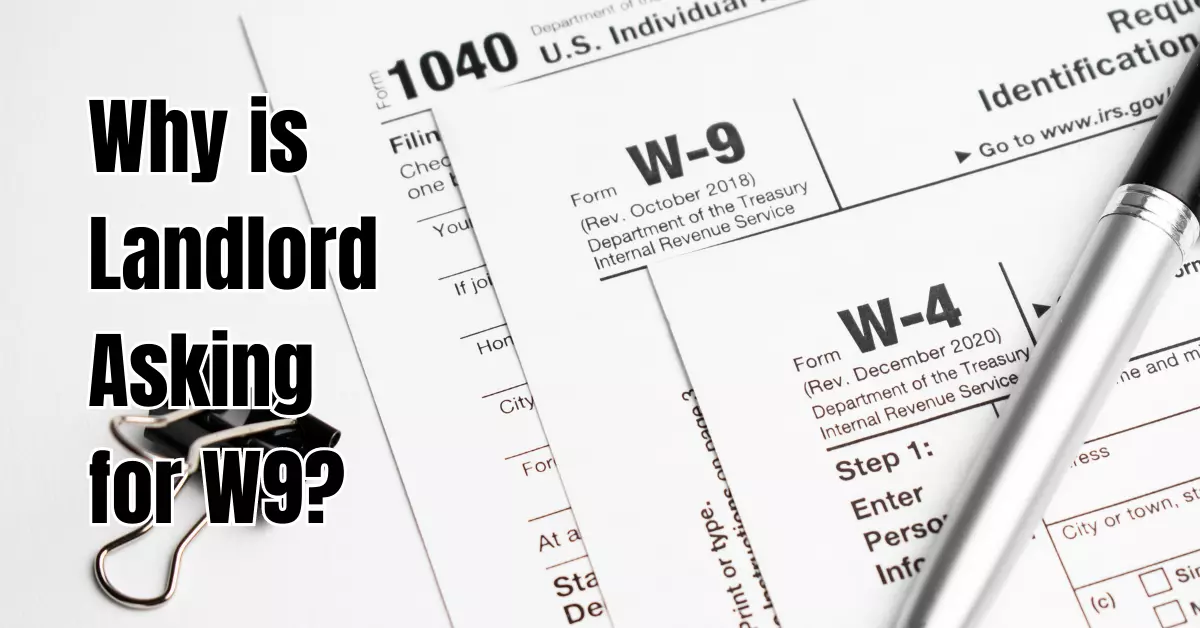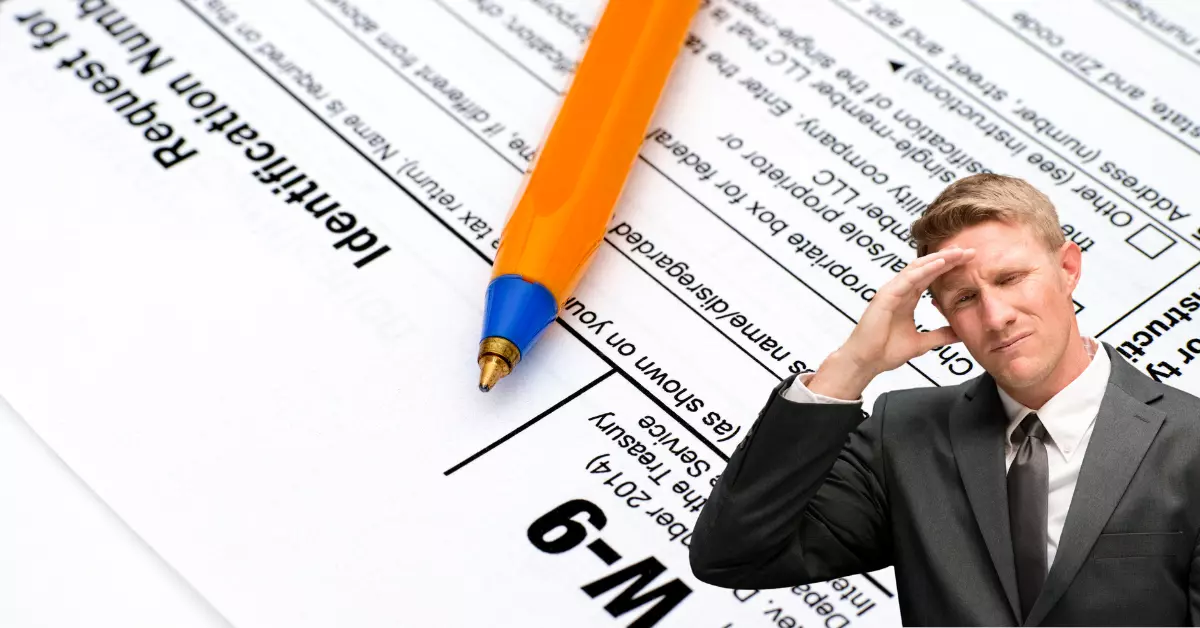Why is Landlord Asking for W9?
Your landlord is most likely asking for a W-9 because they need your taxpayer ID number to report interest earned on your security deposit. In some states, landlords must keep security deposits in interest-bearing accounts. When that interest reaches $10 or more per year, they’re required to report it to the IRS.

This is actually a good sign. It means your landlord is following state law and keeping your deposit properly. Most landlords don’t bother with this paperwork at all.
You might also be asked for a W-9 if you’re receiving housing assistance like Section 8. The housing authority needs to know who’s getting federal funds.
What Is a W-9 Form?
A W-9 is a simple tax form from the IRS. It asks for your name, address, and taxpayer ID number.
For most people, that taxpayer ID is just your Social Security Number. If you have a business, you might use an Employer Identification Number instead.
The W-9 doesn’t go to the IRS directly. Your landlord keeps it on file. They use it to prepare tax forms if needed later.
Think of it like giving your employer your Social Security Number when you start a new job. It’s standard tax paperwork.
When Landlords Request W-9 Forms

The most common reason is security deposit interest. Some states require landlords to put your deposit in a special interest-bearing bank account.
States with this requirement include Massachusetts, New York, New Jersey, Connecticut, and several others. Each state has different rules about how much interest you’re owed.
If your deposit earns $10 or more in interest during the year, your landlord must send you a 1099-INT form. That’s a tax form showing how much interest you earned. To create that 1099-INT, they need the information from your W-9.
Another common situation is Section 8 or other housing assistance programs. The public housing authority pays part of your rent directly to your landlord. The government needs to track where that money goes. Your landlord fills out a W-9 so the housing authority can report the payments properly.
How Security Deposit Interest Works
Let’s say you paid a $2,000 security deposit. Your landlord puts it in an interest-bearing account that earns 2% per year.
After one year, that deposit would earn about $40 in interest. Since that’s over $10, your landlord has to report it to the IRS.
You’ll get a 1099-INT form in January showing that $40 in interest income. You’ll need to include it when you file your taxes. Yes, you do have to pay taxes on that small amount of interest.
The good news is that in many states, you get to keep that interest when you move out. Your landlord can’t pocket it for themselves.
Do You Have to Fill It Out?
In most cases, yes. If your landlord has a legitimate reason for asking, you should provide it.
If you refuse to fill out a W-9, your landlord might be required to withhold 24% of any payments to you. That’s called backup withholding. For security deposit interest, they’d keep 24% and send it to the IRS instead of giving it to you.
You can ask your landlord why they need the W-9. They should be able to explain it clearly. A reputable landlord won’t have any problem telling you.
If they’re keeping deposits in interest-bearing accounts as required by state law, that’s a valid reason. If you’re on Section 8, that’s another valid reason.
Protecting Your Privacy
It’s normal to feel uncomfortable sharing your Social Security Number. That’s sensitive information.
Only give your W-9 to a legitimate landlord through a secure method. Don’t email it or text it. Hand it directly to your landlord or property manager. You can also send it through a secure tenant portal if your building has one.
Make sure you trust your landlord first. If you’re just starting to look at apartments and someone asks for a W-9 before you’ve signed a lease, that’s suspicious.
If you have a business, you can get an Employer Identification Number from the IRS in about five minutes online. Then you can use that on the W-9 instead of your Social Security Number.
What Happens After You Submit It

Your landlord will keep the W-9 in their files. They won’t send it to the IRS.
If your security deposit earns less than $10 in interest for the year, nothing else happens. You won’t get any tax forms and you don’t need to report anything.
If the interest reaches $10 or more, your landlord will send you a 1099-INT form in January. You’ll also get a copy sent to the IRS. You’ll need to report that interest as income on your tax return.
For Section 8 tenants, the housing authority uses the W-9 information to file their own reports with the IRS. This tracks the rent payments going to your landlord.
State-Specific Requirements
Not all states require interest-bearing security deposit accounts. The rules vary widely.
Massachusetts requires landlords to pay 5% interest or the actual bank interest rate, whichever is less. New York requires landlords in buildings with six or more units to keep deposits in interest-bearing accounts.
California doesn’t require interest on security deposits at all. Neither does Texas, Florida, or many other states.
Check your state’s landlord-tenant laws to see what applies to you. Your lease should also spell out whether your deposit earns interest.
When to Be Suspicious
A W-9 request should come from your actual landlord or property management company. It should happen after you’ve signed a lease or are about to sign one.
Be wary if someone asks for a W-9 before you’ve even applied for an apartment. That’s unusual and could be a scam.
Don’t give a W-9 to someone claiming to be a landlord who you’ve only talked to online. Make sure you’re dealing with the actual property owner or legitimate management company.
If your landlord asks for a W-9 years into your tenancy out of nowhere, ask why. They might be switching banks for the security deposit account. Or they might be trying to investigate you, which isn’t appropriate.
What About Commercial Tenants?
The rules are different if you’re renting commercial space for a business. In that case, your tenant (if you’re the landlord) or your landlord (if you’re the business owner) might need a W-9 for different reasons.
Businesses that pay more than $600 in rent per year may need to issue a 1099-MISC form. That’s why a commercial tenant might ask their landlord for a W-9.
This is completely normal in commercial real estate. The business needs to report the rent payments as a deduction on their taxes.
FAQs
Can I refuse to give my landlord a W-9?
You can refuse, but your landlord might be required to withhold 24% of payments to you and send it to the IRS as backup withholding. If the interest on your deposit is minimal, you might not care about this.
What if my landlord never asked for a W-9 before?
Many landlords don’t follow the law about interest-bearing security deposit accounts. If yours is now asking for a W-9, they might be switching banks or trying to get into compliance with state law.
Do I need to report security deposit interest on my taxes?
Yes, if you receive a 1099-INT form showing $10 or more in interest. Even if you don’t get a 1099-INT, you’re technically supposed to report all interest income, no matter how small.
Can I use an EIN instead of my Social Security Number?
If you have an Employer Identification Number for a business, you can use that instead. You can get an EIN from the IRS website in about five minutes for free.
What if I’m uncomfortable giving my Social Security Number?
Ask your landlord to explain exactly why they need it. If they have a valid reason like state law requiring interest-bearing accounts, you’ll probably need to provide it. You can also consider getting an EIN to use instead.
Does my landlord report my rent payments on a W-9?
No. Regular residential rent payments are not reported to the IRS and don’t require a W-9. The W-9 is only for reporting interest or for government housing assistance tracking.
What happens if my landlord loses my W-9?
Your landlord should keep it securely in your tenant file. If they lose it, they might ask you to fill out another one. This is one reason to keep a copy for yourself.
Final Thoughts
A W-9 request from your landlord is usually straightforward and legitimate. Most of the time, it’s because state law requires them to keep your security deposit in an interest-bearing account. When that interest hits $10 per year, they need your tax ID to report it properly.
If you’re on Section 8 or another housing assistance program, the W-9 helps the housing authority track federal funds. This is normal paperwork for subsidized housing.
Don’t panic when you see the request. Just verify it’s coming from your actual landlord and that they have a good reason for asking. Ask questions if you’re unsure.
Keep a copy of the completed W-9 for your own records. Send it securely and directly to your landlord, not through email or text. If you’re really uncomfortable sharing your Social Security Number, consider getting an EIN from the IRS instead.